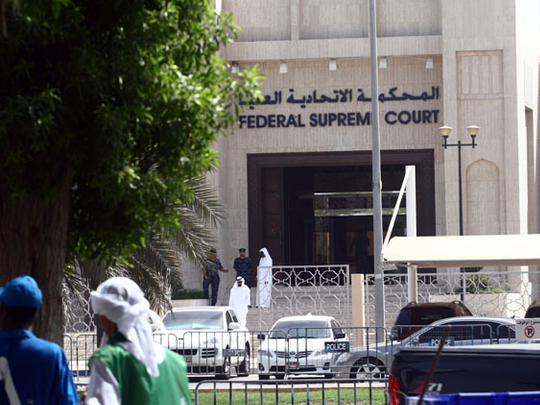
Abu Dhabi: The State Security Court at the Federal Supreme Court on Tuesday found all 30 suspects guilty of belonging to an Egyptian-Emirati branch of the Muslim Brotherhood.
Their sentences ranged from three months to five years in jail and the verdict is not subject to appeal. The defendants comprise 10 Emiratis and 20 Egyptians.
The verdict also applies to the six Egyptians who fled the country and were tried in absentia. The judge also ordered that the 14 Egyptian defendants be deported after serving their sentence.
Yesterday’s sixth and final session was the shortest since the trial began on November 5 — lasting only five minutes.
Presiding Judge Mohammad Abdul Rahman Al Tunaiji also ordered that the organisation be disbanded, its offices across the country be shut down and all the offices’ contents and devices be seized.
Before the session, which started at 10.15am, one of the Egyptian suspects in the courtroom aggressively shouted to members of the media who were covering the trial and the Emirates Human Rights Association, who had failed to send a representative to visit them in jail. He was soon surrounded by six police guards and riot police who tried to calm him down.
Transparent
Before the judge entered the courtroom, one of the Emirati defendants declared he was innocent of all six charges, pledged his allegiance to the country, and requested that all relatives sitting in the courtroom refrain from any outbursts if the verdict was not in their favour.
Once the court was in session, Judge Al Tunaiji first declared that the trial had provided each suspect with the opportunity to defend themselves.
“The trial was transparent and fair, which also addressed the defendants’ requests as per procedures of the UAE constitution and international human rights laws,” he said. “The court reached a verdict based on all the documents and evidence presented and took into account all the information presented by the Public Prosecution, lawyers, eyewitness accounts and expert reports,” said Judge Al Tunaiji.
When the guilty verdict was announced, the defendants were shocked and started shouting “Subhan’ Allah” (Glory be to God) while some could also be heard praying loudly.
Only three of the Emirati defendants were present in court, as the remaining seven refused to attend in protest for not being allowed to see their lawyers. The three lawyers defending the suspects — Abdul Hamid Al Kumaiti, Yasser Al Naqbi and Hamdan Al Zyoudi — also failed to appear in court.
The session was attended by 19 journalists, three Emirates Human Rights Association representatives, one from the Lawyers’ Association and one from the Writers Association, in addition to nine male and five female relatives of the accused.
Mohammad Al Ka’abi, a board member of the Emirates Human Rights Association, told Gulf News: “The Egyptian suspects were visited by their ambassador and more than once by the Consul General and his representatives. But we intend to visit them now that the verdict has been handed down.”
The ten Emirati defendants are already serving a ten-year-sentence handed down last July for their roles in belonging to the now-disbanded Al Islah organisation that plotted to overthrow the government.
During the two-month trial, the Public Prosecution accused the defendants of establishing and operating a secret cell of the Muslim Brotherhood in the UAE, and collecting funds to support their illegal organisation through zakat and sadaqa (donations), membership fees, and also receiving additional investment from a number of sources in the UAE.
A number of suspects were charged with embezzling classified information that related to national security, which was later leaked through social networking sites and members of the organisation.
The prosecution also showed that the group had six offices across the country — one each in Abu Dhabi, Al Ain, Dubai, Ras Al Khaimah, and one office for Sharjah and Fujairah, while another office catered to Ajman and Umm Al Quwain.












